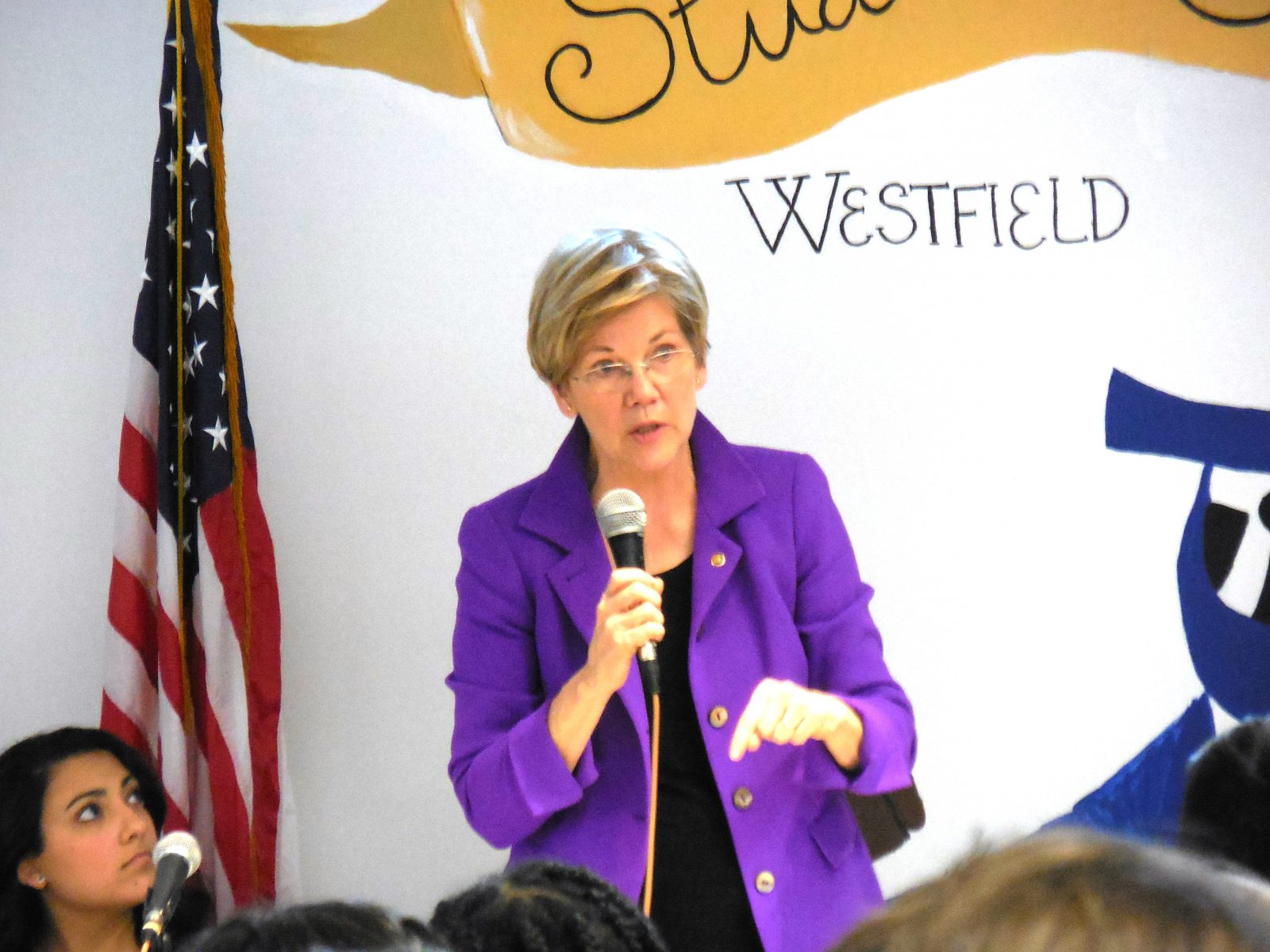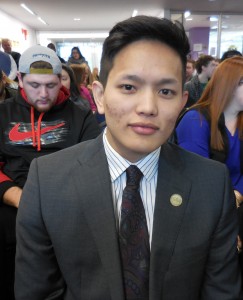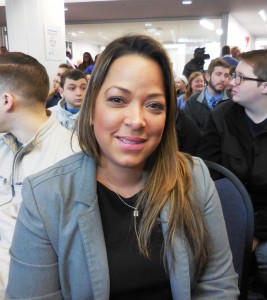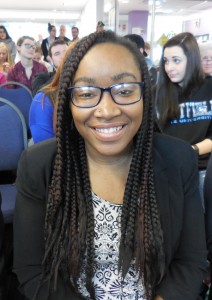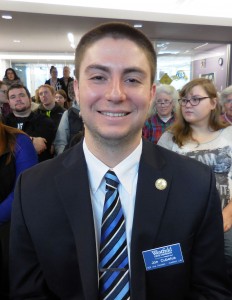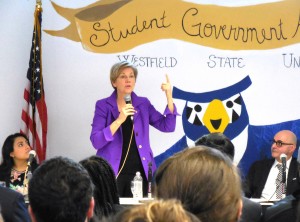
U.S. Senator Elizabeth Warren responds to a question by students at Westfield State on Monday. (Photo by Amy Porter)
WESTFIELD – United States Senator Elizabeth Warren visited Westfield State University on Monday to hear from students receiving financial aid about the impact of this debt on their lives. Also present were State Senator Don Humason and State Representative John Velis, Westfield Mayor Brian P. Sullivan, and WSU President Ramon Torrecilha.
Torrecilha introduced Warren in the Garden Room of Ely Campus Center, which was filled to capacity with students. He said that Warren was like a lot of those present, a woman from a working-class family. The first in her family to go to college, she became a teacher, lawyer and law professor.
“She understands the power of education,” Torrecilha said.
Warren said she was glad to be at Westfield State.
“I believe in public universities,” she said to applause. “Public education is in trouble because of the costs going through the roof.”
Warren said the opportunities for higher education are getting farther and farther away for far too many people, saying this fact was a big part of why she ran for the Senate.
Warren said she was able to graduate from a commuter college that cost $50 per semester.
“Students now pay 300 percent more than people of my generation,” she said, adding that students now are collectively $1.3 trillion in debt, and over the last year, student loans increased by over $100 billion.
“We need to bring down the cost of colleges, and reduce the interest rate on student loans,” she said.
Warren explained that she came to Westfield State to hear from the students. Several students that receive financial aid then shared their stories with the gathering.
Bal “James” Bhujel, a sophomore in Psychology and Ethnic and Gender Studies from Worcester, said he was born in a refugee camp in Nepal. His family moved to Massachusetts six years ago. After arriving, his mother struggled both financially and emotionally, and he and his sister were placed in foster care. Despite these challenges, Bhujel graduated high school with honors, and enrolled in Westfield State. His goal is to become a professor.
“Without financial aid, I wouldn’t be here,” Bhujel said.
He said that he works three jobs, and doesn’t make enough to pay his loans.
Katherine Johnson from Centerville, a senior who is majoring in Psychology and Criminal Justice, said she is applying to get her master’s in social work. Johnson said she was adopted by a Massachusetts family from foster care in 2009. Although they saved to pay for her college, her mother got sick, and the money had to be used for living expenses for the family. Johnson said she has worked two jobs since she was 14.
“I think it’s so great the people like you are stepping up to help,” she said to Warren.
Marjorie Rodriguez, who is currently studying for her master’s in social work, became emotional as she told her story to the panel. She was the third of 13 children born to drug-addicted parents in Puerto Rico, and has experienced foster care and bouts of homelessness.
“Don’t let my struggles define who I am,” Rodriguez said.
She said making a better life for her 4-year-old son is her main goal, and she wants to support students in foster care and who are homeless. She said 70 percent of foster youth want to go to college, but only 20 percent ever do, and fewer succeed. Many end up homeless and with food insecurity, according to Rodriguez, citing from a paper that she wrote.
“We need to not only offer financial support for students, but social and emotional support,” Rodriguez said.
“I truly appreciate that our campus is becoming more diverse,” she said and thanked Warren for giving students a voice.
Jamaica Gilmore, who also went through foster care after her mother died when she was 8, is studying to be an elementary school teacher. She said she lives on campus, because she has no permanent home, which also increases her debt load.
Gilmore is trying to complete her studies in four years, to not add more to her debt.
“I’m scared,” Gilmore said.
Earlier, she said it’s the interest more than anything else gets people.
Finally, Jon Cubetus of Sandwich, said that despite living on Cape Cod, his family does not have a lot of money. His mother has been unemployed over the last three years, and his father works at the post office.
Cubetus said he is already $32,000 in debt, and is only a junior, studying Criminal Justice and Political Science. He said his debt will probably reach $40,000 before he graduates and goes to law school, which will mean another $50,000 a year of debt.
“I pray that I won’t have to pay my debt before I go to law school,” Cubetus said, adding that he would like to work on the issue of student debt in the future.
Warren and Torrecilha thanked the students for sharing their stories, and asked if there were any other comments or questions from the audience.
Student trustee Justin Connelly, who said he will also be facing debt when he graduates in May, asked what Warren plans to do about the issue.
Warren said that she and fellow Democrats are working on the “In the Red” campaign, based on something President Barack Obama said in his State of the Union address in January: that no one should have to be in the red just trying to get an education.
She said the campaign has two parts. One is to try to bring down the cost of college by offering two years of community college for free.
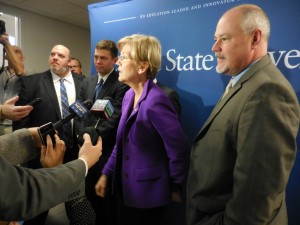
U.S. Senator Elizabeth Warren answers questions from reporters after meeting with students at Westfield State on Monday. Also present were Rep. Don Humason, Rep. John Velis, and Westfield Mayor Brian P. Sullivan. (Photo by Amy Porter)
The other part is to reduce the interest rate on student loans. Warren said her first bill which she introduced “25 minutes” after becoming a Senator, was to charge the same interest rates to students that is charged to the giant banks, about 1 ½ percent. Warren said that while that idea didn’t pass, the debate did bring about a reduced interest rate.
“I know how frustrating this is,” Warren said to the student gathering. “This is a problem we can fix.”
She pledged to bring back the stories that were shared to face-to-face meetings in Washington.
“We’re a country of opportunity,” Warren said after the gathering. “That is what we are. It’s up to the rest of us to give them a shot.”

